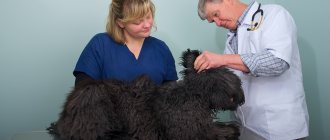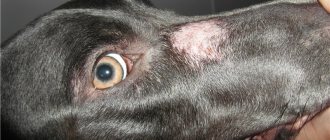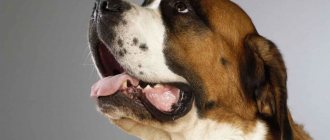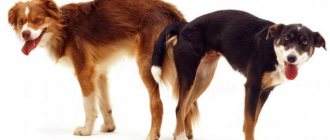Ekaterina Shulga
veterinary therapist
Sometimes pet owners are faced with the problem that their dog's muzzle is swollen. There are many causes of muzzle swelling, and the amount of swelling can vary greatly. The sensations of swelling in dogs can also be different - from pronounced pain and itching, in which the pet feels unwell, to mild discomfort. If swelling of the muzzle occurs, you should consult a veterinarian, regardless of the suspected cause.
- If a prompt visit to the veterinarian is not possible
Possible Causes of Facial Swelling in Dogs
The main causes of edema can be divided into two groups:
- General reactions - for these reasons, the entire muzzle or most of it swells. These are allergies, reactions to insect and snake bites, poisoning, post-vaccination reactions and reactions to medications, infectious diseases.
- Local edema manifests itself as severe swelling in one place: on the dog's nose, lip, under the eye or on the cheek. And its causes are: neoplasms, inflammation of tooth roots, chemical burns, trauma.
Let's look at each of the reasons in more detail.
Food or contact allergies
Quite often the reason why a dog has a swollen face is an allergy. The rate of development of edema depends on the amount of allergen entering the body. The more allergen, the faster and more pronounced the swelling appears. Typically, swelling due to allergies is symmetrical, spreads over the entire head, and is often accompanied by itching, but overall the animal feels well, eats and behaves as usual. Most often, an allergy in a dog is manifested by swelling of the muzzle to food rich in chemicals, shampoos, cosmetics of the owner, and pollen.
Reaction to insect and snake bites
Snakes, stinging and blood-sucking insects, when bitten, release poison in the form of an active protein. The animal’s body perceives this protein as foreign, and an acute allergic reaction begins. If the bite was in the head area, the dog's muzzle swells and the nose swells. The bite site is hot and painful, the dog constantly scratches it, and soft tissue necrosis may develop at the bite site.
Poisoning
Some plants have toxic components - oxalates, which cause a sharp swelling of the subcutaneous tissue, and the pet's face swells upon contact with them. Toxin poisoning is an emergency and you should contact your veterinarian immediately. If possible, try to recognize the toxin and tell the doctor (name and photo of the plant or poison packaging). Also, in addition to swelling, other symptoms may appear: heavy breathing, vomiting, confusion, diarrhea.
Post-vaccination reaction
The reaction is very similar to an allergy reaction. This is the most dangerous complication in vaccination, as it develops rapidly and can occur at any age and in any dog. Most often, dogs' ears, nose, and eyes swell. Salivation, attacks of suffocation, and loss of consciousness may also begin. At the first symptoms of an allergy, a veterinarian provides first aid. Usually the reaction goes away as quickly as it occurs, so within a few minutes after administering the drugs the dog will feel better.
Infectious diseases
The lymphatic system of dogs reacts to any infection that enters the body. And often, as a result of this invasion, the lymph nodes begin to swell and cause inflammation in the places where they accumulate. The head and neck are no exception; inflammation of the muzzle and neck begins. Swelling can be on one side or both, depending on the volume of the inflamed lymph nodes.
Reaction to medications
It occurs as a reaction to vaccination or an allergy. It also appears a few minutes after administration of the drug. Clinical signs can be different: swelling of the head and neck, bumps on the body, active breathing, redness of the mucous membranes, drooling.
Neoplasms
A tumor on a dog’s face, as a rule, does not occur suddenly. The swelling grows gradually and may not cause discomfort to the pet for a long time. Just like in humans, no clear cause of cancer has been identified in dogs. Various types of sarcomas are the most common tumors. During the neoplastic process, soft tissues and bones may be involved, so the clinical picture will be different.
Inflammation of the roots of the teeth
If your dog has a noticeably swollen cheek or swelling under his eye, it is unlikely that he has a tumor. Most likely the reason is in the teeth. When the teeth are inflamed, the roots are exposed or broken, then, just like in humans, purulent inflammation can occur - an odontogenic abscess. Dogs have a rather narrow jaw bone, so when the root of a tooth becomes inflamed, the swelling quickly grows under the eye or on the cheek in the projection of the diseased tooth.
Injury
The cheek may also swell suddenly due to blunt trauma. After extensive impacts, the blood vessels are injured and burst, resulting in hematoma and swelling. Typically, a dog's eye swelling is most noticeable when injured. When providing first aid, you can cool the injury site so that the blood vessels spasm and the formation of a hematoma stops.
Bacterial infections
If the injury is punctured or bitten, an abscess may form. An abscess is a limited cavity with purulent contents; its development is provoked by bacteria that have penetrated through the wound. It is distinguished from a tumor or hematoma by the presence of severe pain. It grows gradually over several days, and every day it becomes softer and hotter, until the moment it bursts and pus flows out of it.
Allergic reaction
When a dog's face suddenly becomes swollen, it is usually caused by an allergic reaction. Allergic reactions can be caused by insect stings, bee stings, vaccinations, medications, certain foods, exposure to toxins, pollen and other environmental allergens.
Allergic reactions cause a specific inflammatory response in the body. This can lead to hives and swelling, especially on the scalp. You may especially notice swelling of the muzzle, jowls, and eyelids. The neck may also be swollen and even affect breathing. Some allergic reactions progress quickly, leading to severe breathing problems or even seizures and death. Mild reactions usually improve with little intervention, but major reactions are treated as emergencies.
Associated symptoms
When there is swelling of the muzzle, an animal may have accompanying complaints that will help determine its main cause:
- itching indicates an allergy or the presence of a bite;
- pain indicates injury or bite;
- depressed state and loss of appetite indicate an increase in temperature due to the development of inflammation or infection;
- salivation, confusion, redness of mucous membranes are formed due to an acute allergic reaction.
What could it be?
- Swelling of the muzzle - allergy, inflammation, insect bite, suppuration, tumor
- Swollen paws - inflammation, allergies, abscess, tumor, heart failure, liver pathologies
- Swelling of the mammary glands - estrus, mastopathy, false pregnancy, tumor
- Swollen eyes
- conjunctivitis, allergies, insect bites, trauma - Swollen nose - swelling, injury, inflammation, allergy, insect bite, infection, tumor
- The ear is swollen - otohematoma, suppuration, trauma, otitis externa
- Swollen nipples - estrus, mastopathy, breast tumor
- Swollen eggs (swelling of one testis) - tumor - semenoma, inflammation (orchitis, epidymitis), trauma, testicular torsion
Diagnostics
Often, when there is swelling of the muzzle in dogs, to determine its cause, it is enough to collect an anamnesis and remember that something new preceded the development of symptoms. Has the pet had contact with anything - plants, cosmetics, insects? Or he got into a fight the day before, and there were injuries and bites. Diagnostics in the form of x-rays will be required if dental disease is suspected. To make a diagnosis, it is enough to examine the oral cavity, first identify the diseased tooth, take an x-ray and assess the degree of inflammation. If an oncological process is suspected, visual diagnostics are used - x-rays and computed tomography, as well as cytological examination of tissue samples. If you suspect the development of an infectious process, you will need to conduct a clinical blood test, examination and temperature measurement; tests for infections may be prescribed in the presence of specific complaints - diarrhea, vomiting, nasal discharge, cough.
Hurry up, choose a box and find out what gift awaits you
Discount on pet insurance
Promo code copied to clipboard
Good to know
- Dog breathing problems?
- Why does my dog often vomit yellow or white foam?
- Why doesn't the dog eat anything? The dog doesn't eat?
- Why does a dog scratch its ears and shake its head?
- The reason why your dog constantly whines?
- Why is my dog breathing heavily and frequently?
- Why does a dog eat cat feces?
- Why does a dog drink a lot of water?
- Eye discharge in dogs
- Why does a young dog have bad breath?
- Why does a dog lose hair?
- Why does my dog have diarrhea? Dog diarrhea
- How to treat bartonellosis in dogs
- Bordetelosis and Bordetella in dogs
- How to treat adenovirus in dogs?
- Why is the dog lethargic?
Treatment
If the cause of the complaints is an allergy, it is necessary to exclude the allergen from the pet’s life and give an antihistamine. If the cause of the swelling is a bee sting, it is necessary to remove the sting, treat the sting site with chlorhexidine, peroxide or, as a last resort, any alcohol solution and apply cold cold water to the sting site. If you are bitten by a snake, you must try to suck out the poison and disinfect it. Make sure your dog does not scratch the bite site and drinks more. When inflammatory processes develop due to the penetration of bacteria and viruses, treatment is carried out with antibacterial drugs, and symptomatic treatment is also prescribed depending on the existing complaints.
One of the longest and most difficult treatments is carried out during the development of the oncological process. Cancer treatment is not always possible; surgery and chemotherapy are prescribed. The stage at which the owner seeks help is very important. The longer you wait without treatment and the larger the tumor grows, the less likely it is for successful treatment.
A considerable amount of treatment is also carried out for diseases of the oral cavity - dental procedures and antibacterial therapy are necessary.
If a prompt visit to the veterinarian is not possible
Before providing assistance at home, determine where exactly the swelling of the muzzle has occurred, whether it is preventing the dog from breathing, and whether she is conscious. Try to remember what preceded the swelling - whether you walked in the field, whether you gave him something new to eat, or maybe the dog got into a fight with someone. Examine the head for injuries, bites, pus, blood, and signs of scratching. Once the preliminary cause has been determined, you can try to provide assistance.
For example, treat wounds if they exist, remove the sting if it is a bite. And give an antihistamine - it is best to keep it in the medicine cabinet (Tavegil, Cetrin, Zodak).
When you need urgent veterinary help
Some causes of swelling require immediate attention to a veterinarian. If, in addition to swelling of the muzzle, you observe additional symptoms in your dog, such as a change in the color of the mucous membranes, blueness or pallor, repeated vomiting or diarrhea, a sudden change in body temperature, discharge from the swelling, difficulty breathing, convulsions, confusion, you must immediately contact a veterinarian clinic. In these cases, it is impossible to provide first aid yourself at home, and every minute counts.
Can complications arise?
If you promptly seek help from a veterinarian and treat your dog in accordance with his instructions, you will be able to avoid complications that arise from inflammation of the lymph nodes in animals. If this is not done, the functioning of the entire lymphatic system will be impaired, which means that the pet will lose the natural barrier that protects it from infections.
With nonspecific lymphadenitis, the following complications are possible:
- phlegmon,
- abscess,
- thrombophlebitis,
- sepsis,
- lymphostasis, etc.
The prognosis in the absence of treatment is death.
Prevention
- Examine your pet after active games with other dogs and treat any wounds found.
- Regularly inspect your mouth for the integrity of your teeth and the presence of tartar. Also, do not forget about the prevention of tartar - brush your teeth regularly.
- Feed your dog correctly. Avoid allergens and too many food components.
- Avoid contact with poisonous plants and chemicals.
- Treat regularly against external parasites.
- If you decide to walk your dog in a new area, keep it off the leash and explore the local flora and fauna.
- Have an annual examination by a veterinarian.
Answer
Let's look at non-cancerous lumps. Causes of compaction: inflammation of the sebaceous glands, viral infections, damage to tissue, blood vessels, trauma, changes in hair follicles. The tumor is located under a thin layer of skin. This is immediately discovered. Non-cancerous tumors are treated.
Owners should check their pets regularly. Such compaction causes discomfort. The animal will itch. It may develop into a serious tumor.
Noncancerous lumps require medical attention. If you show the patient to a veterinarian immediately, there will be no consequences. Sometimes the affected area is removed, sometimes it is treated with medication.
Areas of soft tissue become inflamed. In this case, palpation is required. A dense area is felt when viewed in the animal’s body. It's treatable.
Cancerous lumps
This is visually unnoticeable. Found during examination, combing, bathing. Seals are removed surgically. The pet requires treatment.
A tumor develops by using the body's resources. Cells change structure. The tissue begins to multiply and grow. The tissue looks like ulcers or bumps.
Some breeds are at risk of cancer. These are boxers, mastiffs, terriers, and retrievers. The patient loses his appetite and moves little. The affected area smells unpleasant.
Also, the affected area sometimes bleeds. At the same time, the pet begins to move differently. The swallowing reflex is difficult. Doctors' intervention is required.











